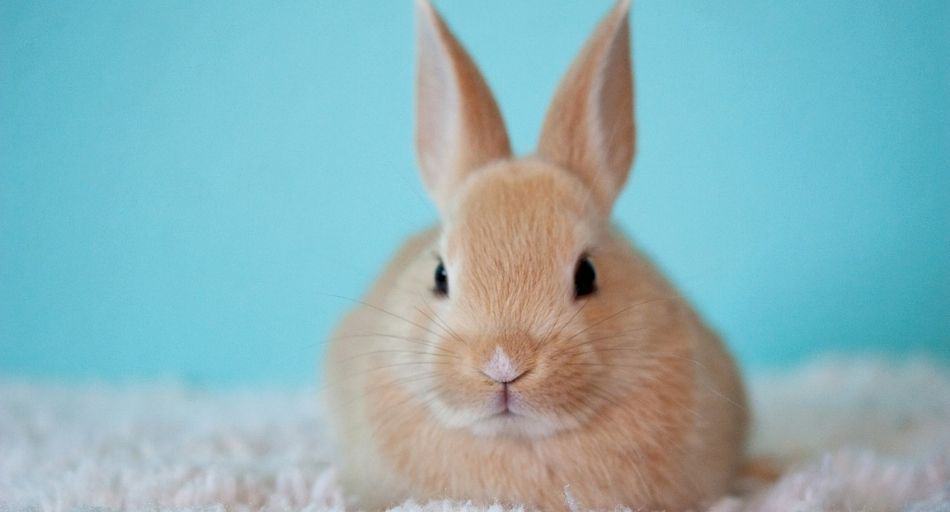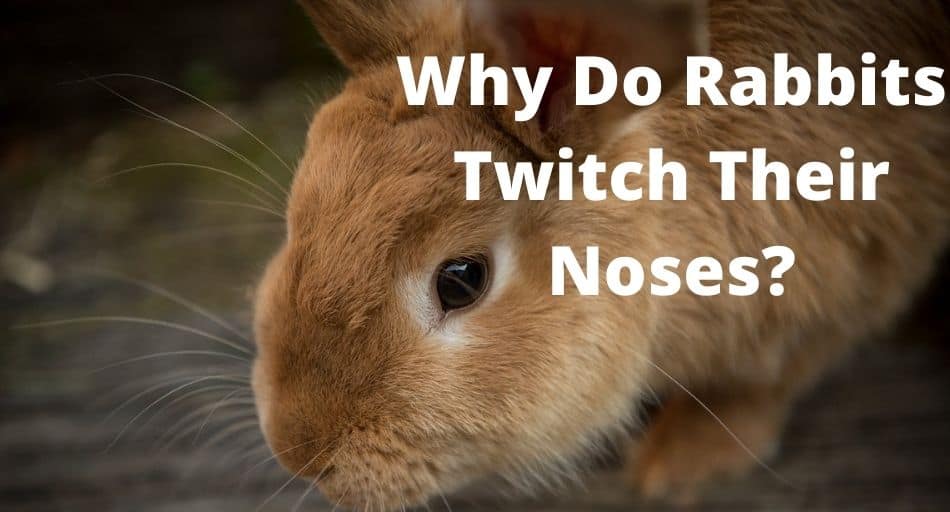As an affiliate, we earn from qualifying purchases on Amazon. We get commissions for purchases made through links in this post.
Rabbits are cute pets with fluffy ears and twitchy noses. They wiggle their noses regardless of breed. But, why do rabbits twitch their noses?
Does the wiggling/twitching mean anything? Does the twitching have anything to do with how they smell and navigate their environment?
This are important questions that could be lingering in your mind and will be of focus today throughout this article.
We’ll be looking at what all this means to be able to give you a better picture of why rabbits twitch their noses.
Let’s get to it.
Why Do Rabbits Twitch Their Noses
Why do rabbits’ noses twitch? Rabbits twitch their noses to help them to breathe easily, smell better and regulate their body temperature. Rabbits cute little noses have over 100 million scent receptors that help them identify odor. Whether it’s detecting food, predators, and mating partners, rabbits will use their twitching noses for this. They are also able to detect the scent of nearby predators, using it as a defense mechanism.
Rabbits make use of olfactory receptor cells to be able to navigate their environment. Baby rabbits (kits) will be born with its eyes closed but it’s still able to locate the mom’s nipples. Why is that?
They rely 100% on their strong sense of smell. Although not as strong as dogs, their sense of smell is far superior to ours.
They’ll therefore navigate, locate food, or perceive danger by solely relying on their noses. This is why their noses are always twitching.
| Image | Product | Details | Price |
|---|---|---|---|
 |
Kaytee Fiesta Rabbit Food, 20 Pounds | ✔️ Assorted fruits & veggies ✔️ Rich in Natural antioxidants ✔️ Supports Dental Health |
Check Price |
 |
All Natural Rabbit Pellets | ✔️ Supports Immune System Health ✔️ Perfect for Picky Eaters ✔️ Fortified with vitamins & minerals |
Check Price |
 |
Kaytee Supreme Rabbit Food 5 lb | ✔️ Natural seeds and grains ✔️ No artificial colors or flavors ✔️ High-quality ingredients |
Check Price |
Are there key instances when bunnies will twitch their noses the most?

5 Instances When Rabbits Noses Twitch
There are a number of instances when rabbits’ noses twitch the most. Twitching is common in all rabbit breeds but could be common in certain instances.
Let’s now look at some of these instances below.
During Feeding Time
Rabbits will twitch their noses in excitement when feeding time arrives. Their noses will be seen actively wiggling as they try and smell the treat being offered to them.
They do this to be able to get an understanding of the treats being offered as well as their freshness. You might have seen them sometimes, refuse to take certain food when they feel it isn’t fresh or good for their consuption.
They rely on their strong sense of smell that helps them determine if it’s good for consumption or not. Therefore, making good use of their noses during feeding time.
When They Are Stressed
Rabbits just like us humans can also experience stress. Stress could also come in the form of sexual frustrations. Female rabbits always stay on heat once they are sexually matured, and never leave this state throughout their life.
When they are not spayed and are on heat this could leave you with one stressed bunny that’s constantly twitching her nose.
other causes of stress in rabbits could be environmental. This could include, presence of predators for non-domesticated rabbits or the prospect of being picked up. In such instances, you’ll observe your bun twitching their noses.
Extreme temperatures can also cause stress in rabbits leading to them twitching their noses due to stress factors.
When Happy and Relaxed
Bunnies love attention. When they are completely relaxed and happy, you’ll observe them twitching their noses.
This will mostly be in the form of slow nose twitching. You’ll mostly experience this when you are petting them on your lap.
When Exploring New Territories
New territories come with new challenges. Rabbits love exploring, especially when they are moved to a new environment.
Their curiosity and the new to explore new territories comes with more nose twitching to try and get a better understanding of their new environment.
They’ll also mark their territories using scent glands located under their chins.
When Building a bond
When you try to bond with your rabbit the very fast time, you’ll notice them wiggling their nose as they could be scared of their new owner.
At first, you’ll notice heavy breathing and taking in as much air as possible in order to get an understanding of your scent – “smelling you out”, allowing you for a better understanding of its new owner.
As the rabbits get to know you better along the way, you’ll notice a more relaxed and slower twitching of their noses over time.
Do Rabbits Noses Twitch When They Sleep?
Rabbits’ noses will stop twitching when they are sleeping. They use their noses to navigate their environment. When they are sleeping they are no longer paying attention to their environment anymore. So you’ll barely see them wiggle their noses when they sleep.
Other than when they sleep, there are other instances when rabbits may not twitch their noses.
But first, what does it mean when a rabbit’s nose stops twitching? Rabbits’ noses will stop twitching when they are relaxed and not in the discovery phase of their new environment or due to some possible health concerns.
It also means they are well versed with their current environment and trust everything and everyone around it, hence the lack of nose twitching – they are not trying to gather any more information.
Other instances when rabbits don’t twitch their noses include:
- When they are relaxed: When rabbits are too calm and are not cautious of their environment they minimize their twitching, giving out the appearance that it isn’t moving at all.
- When a foreign object is stuck in their nose. This could be in the form of tiny grains or hay that might have been stuck in their noses during feeding time. These foreign objects will leave your bunny experiencing a runny nose and difficulty in breathing – giving the illusions that their noses aren’t twitching.
- Possible health concerns: Health concerns such as snuffles and pneumonia. Snuffles affect the rabbit’s nasal parts and are caused by bacteria that are resistant to antibiotics. The symptoms are mostly runny nose and sneezing affecting the rabbit’s breathing – their nose twitching. If symptoms persist you need to get your bun checked by a vet as soon as possible.
- When alarmed: A sudden loud voice can shock rabbits to the point that their noses stop twitching briefly. This will be followed by the rabbit running into hiding.
Why Do Rabbits Noses Twitch Too Fast?
Rabbits’ noses twitching too fast could be a sign that your rabbit is on high alert. It could also mean that your rabbit is overstimulated or stressed.
You may also notice their noses twitching at a fast rate when being exposed to a new diet. They’ll use their noses to sniff around and get relevant information about the new diet and whether it’s safe for them to eat.
Their noses will also twitch at a fast rate when you introduce a new rabbit to your bun. They’ll use their noses to get a better understanding of each other by gathering information about each other.
A fast twitching rabbit could also indicate agitation. They could be scared, anxious, or stressed and their first cause of action would be to run far away from you.
| Image | Product | Details | Price |
|---|---|---|---|
 |
Indoor Outdoor Bunny Cage | ✔️ Durable & Weatherproof ✔️ Easy to Clean ✔️ Special design |
Check Price |
 |
Extra-Large Rabbit Cage w/Wood or Wire Hutch | ✔️ Extra-Large Space ✔️ Easy Maintenance ✔️Convenient Access |
Check Price |
 |
Indoor Rabbit Hutch with Hideout for Rest | ✔️ Spacious Space ✔️ Thoughtful Design ✔️ Sturdy to Use |
Check Price |
Final Thoughts
Rabbits use their noses to navigate their environment. They have a strong sense of smell that helps them perceive their environment better.
They twitch their noses the most when exposed to a new environment or have been exposed to a new diet.
Rabbits always twitch their noses apart from certain instances such as when they are sleeping. This is because they are relaxed and have a proper understanding of their environment and are therefore not looking to explore anything.

